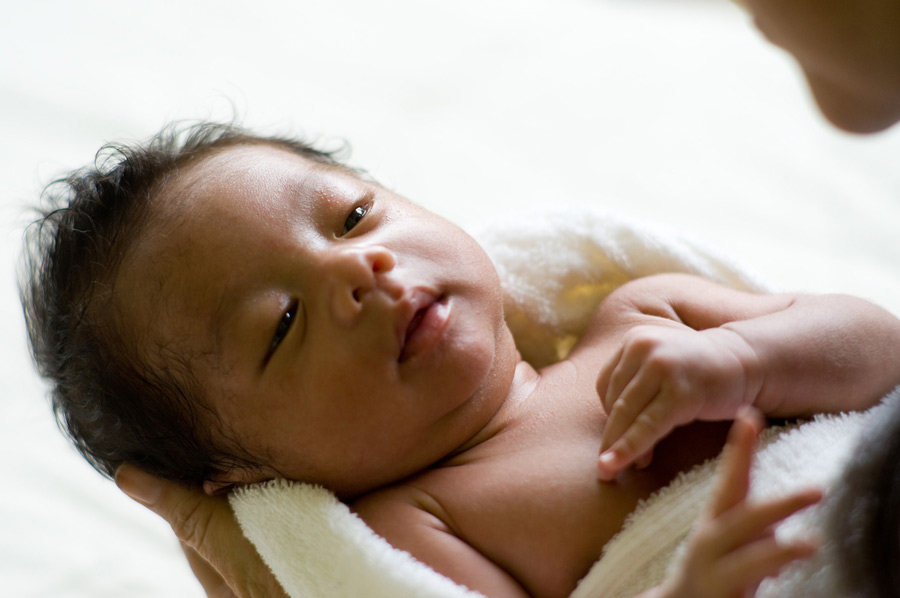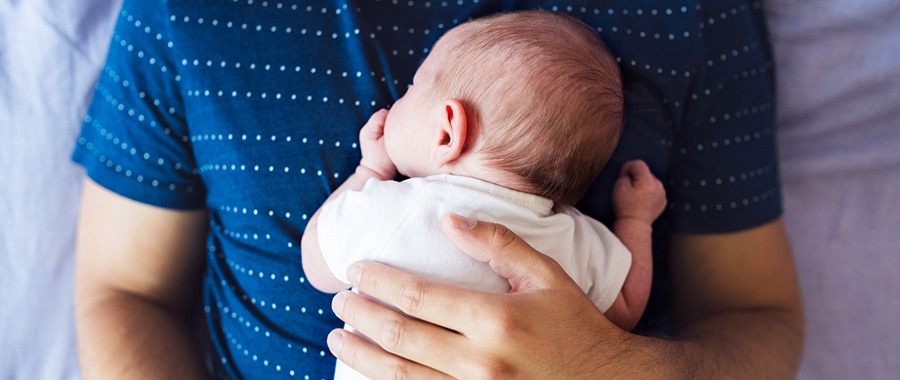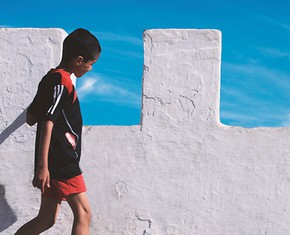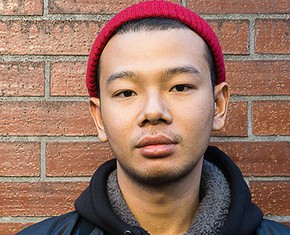The views expressed in our content reflect individual perspectives and do not represent the authoritative views of the Baha'i Faith.
I see my daughter, Andréana, even before my wife does; a small patch of brown thistle emerging into a world of light. The doctor calls it “crowning:”
crownˑing: adj. 1. the emergence of a baby’s head in childbirth; 2. the successful culmination of an effort or endeavor, especially a prolonged one.
One last push and a baby girl child emerges into this world of duality and contradiction on her voyage towards unity.
Strangely, her curious eyes are open and meet mine. Soul to soul, a silent conversation briefly takes place, but all that must transpire between a father and his daughter occurs in that instant. We both know it. A special bond has formed, though no outward utterance has been made; just eyes meeting and silent messages passing between us—unspoken.

Her mother’s joy is palpable. She calls for her child and they lay together for the first time, physically entwined and with a spiritual bond that remains unbroken. Nine months compressed into an instant. Questions, often unanswered, speed through my mind as I contemplate the future—a future replete with all of the contradictions and temptations present in the world now conspiring to affect our lives as a young family. How is a father to help his daughter traverse this world safely and successfully, meeting all of her tests and growing spiritually through the experience?
At the time of our daughter’s birth I had been a member of the Baha’i Faith for all of twelve years, as was my wife—long enough to have broadly understood my general responsibilities as a Baha’i parent. Still, many questions flitted through my mind. Something told me this child would benefit from my years of trial and error, especially since I had been a young father and family man before I was a Baha’i, mostly misunderstanding my role and responsibilities. Now I had another chance:
Unto every father hath been enjoined the instruction of his son and daughter in the art of reading and writing and in all that hath been laid down in the Holy Tablet. … He that bringeth up his son or the son of another, it is as though he hath brought up a son of Mine; upon him rest My Glory, My loving kindness, My Mercy, that have compassed the world. – Baha’u’llah, Tablets of Baha’u’llah, p. 128.
What if I failed to meet that standard? What is a father’s success and what is a father’s failure? What does it look like or feel like? I had just a few years, if that, to get it right:
According to the teachings of Baha’u’llah the family, being a human unit, must be educated according to the rules of sanctity. All the virtues must be taught the family. The integrity of the family bond must be constantly considered, and the rights of the individual members must not be transgressed. The rights of the son, the father, the mother—none of them must be transgressed, none of them must be arbitrary. Just as the son has certain obligations to his father, the father, likewise, has certain obligations to his son. The mother, the sister and other members of the household have certain prerogatives. All these rights and prerogatives must be conserved, yet the unity of the family must be sustained. The injury of one shall be considered the injury of all; the comfort of each, the comfort of all; the honor of one, the honor of all. – Abdu’l-Baha, The Promulgation of Universal Peace, p. 168.
A mother’s duties and obligations to her child are clear within the Baha’i context; she is to be the child’s first educator and provide for the health and nourishment of the child. The father’s is to be, as I understood it, a moral and ethical example to his child, and to always act as a responsible ‘head of the family’ within the Baha’i framework of gender equality, adherence to the principle of consultation amongst all family members, and providing for the security and welfare of this family. That in general formed both the desired and the ideal role of a father. Where then to start on a father’s duty to his child?
All of the competing beliefs and theories about the raising and development of children make things difficult for a father when raising his child in an increasingly secular world; not to mention the myriad of temptations to draw one off the path. How do I know which approach is correct? Which of these competing life paths carries the standard of Truth? Is there one standard? Relative standards? God’s standard? How do I discern God’s standard? How, among all the competing ideas do I find God’s path, the one that provides correct guidance through the thicket of contradictions, for this little soul I love so much?
The Baha’i teachings say that each person, each soul, is born with the God-given capacity to recognize the truth that is God, and to see God’s standard for this new age. That we fail in this recognition, it appears, is the degree to which we are affected by the world and its competing view that we humans are, in the main, a material not a spiritual creation. The Baha’i Faith teaches us that humans are a dual creation; material and spiritual, with the ability to develop both aspects of our being, if we but put aside our presumptions and preconceptions:
In man there are two natures; his spiritual or higher nature and his material or lower nature. In one he approaches God, in the other he lives for the world alone. Signs of both these natures are to be found in men.
… every man hath been, and will continue to be, able of himself to appreciate the Beauty of God, the Glorified. Had he not been endowed with such a capacity, how could he be called to account for his failure? – Abdu’l-Baha, Paris Talks, pp. 60-61.
I also reminded myself that the adage “Children don’t come with an instruction manual” certainly held true for me and my wife, as it does for all new parents. Clearly, we strive to do our best, but we hope to fail less than we succeed. While a pattern for spiritual, ethical and moral behavior forms the foundation upon which we hope to grow ourselves and our children, the simple truth is that we guide and affect each other in a variety of ways; it’s not a top down process, parent to child, but interactive. We learn from each other and grow spiritually as a result.
So I began a father’s journey, hopefully, with my own emerging crowning—a successful traversing of my life, and my daughter’s, with the reward of hearing the hoped-for words of “Well done.”
















Comments
Sign in or create an account
Continue with Googleor